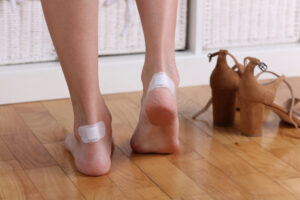 Painful. Irritating. Avoidable. These three words describe my feelings for my multiple feet blisters that finally healed.
Painful. Irritating. Avoidable. These three words describe my feelings for my multiple feet blisters that finally healed.
For weeks, each uncomfortable step I took reminded me of my careless behavior – neglecting to pack sneakers for walking long distances during an out-of-town trip.
As my feet started to mend, I remembered another type of blister – the small irritants that can get in your way when trying to change your behavior. Last year during my Coach.me habit classes, our amazing instructor Kendra Kinnison warned us about these types of blisters that individuals can experience.
She explained that these blisters were caused by various types of friction, sometimes a consistent aggravation and other times something new. If we coaches didn’t help deal with the friction, individuals might have a hard time making any positive change that they could sustain. She advocated starting small and as necessary iterating until you and they could reduce or even remove the friction.
The frictions that contribute to behavior blisters tend to fall into the following three categories, based on my experiences as a coach and frequent blister sufferer (both with habits and skin bubbles):
1.Carelessness – You don’t think clearly about a situation. Or, you may take the time to think, but you decide to take shortcuts or rejuggle your priorities in ways that hold you back.
For instance, in my recent case of blisters, I chose to pack another pair of dress shoes rather than make room in my luggage for sneakers. I focused on work and evening wear rather than envisioning exercise time. Duh! Reflecting on my bad decision, how could I have missed how much I wanted to take morning walks with others along the boardwalk?
2.Closeness – You don’t consider things far from you in time or distance. Instead, you’re focused primarily on your present self in the moment, not what your future self may want or need in the next few years. (By the way, this is natural as humans gravitate toward thinking about the near and now rather than the far off.)
However, when you’re so attentive on the present and things close to you, you may not be taking any time to consider how you want to develop and prepare for your next job, career change, or other opportunity you want to take advantage of or create for yourself. Rather than open yourself up to future options you can work on now, you double down on the present.
3.Cluelessness – You don’t know know what you don’t know, which may prevent you from taking helpful actions. For instance, you may ignore potential symptoms that could indicate a physical or mental ailment. Or, you may have other gaps in your knowledge that you aren’t even aware of, which keeps you from taking action.
And if you’re not putting yourself into new situations or expanding your circle of acquaintances and colleagues, you may not be exposing yourself enough to new ideas and experiences. As a result, you may have less motivation to seek new information, much less set any change goals with new habits to support you. Yet you’re not satisfied with your life.
What’s the upshot of these behavior blisters? These irritants can hurt you both in the short and long-term. For instance, they can cause speedbumps in your daily life, such as interfering with your plans, making you doubt yourself and your abilities, and sabotaging your image and self-confidence, etc. Longer-term, they can cause you to get stuck in the status quo, limit your dreams, and send you on a different path than where you had intended to go.
So what are some effective ways to start small and iterate to deal with and even avoid getting blisters?
First, identify the blister you’re feeling and consider how it’s holding you back. Naming the blister will help you acknowledge and deal with it. As you learn more, the blister may morph, but at least it’s out in the open.
Then, break your pattern and try something different to deal with it. This could be using any or all of these tools:
- Ask yourself questions, such as:
- How committed am I to dealing with this blister?
- What impact is this having on my life?
- What can I do about it?
- What are the gaps in my thinking?
- What’s one small action I can take now to help my blister?
- Based on your answers, get outside resources to help you, such as:
- Books, videos or websites
- Classes, including BJ Fogg’s free online Tiny Habits™ training to learn the skill of building habits
- Friends, relatives or co-workers who can help you think through your issues and may be able to recommend other resources, including professional services
- Get professional help, which can be a whole range of services, including healthcare, counseling, coaching, etc.
If it appears as if your blisters will respond well to coaching, consider Coach.me which has a large roster of specialized coaches. (In the interest of full disclosure, I’m one of those coaches.) Coach.me provides reasonably priced coaching services for targeted support and accountability.
Good luck dealing with your blisters! And if you want to commiserate with me, just reach out. Not only can I empathize, but being human, I’ll probably come down with a few new blisters in the near future – even with the best of my intentions.

0 Comments